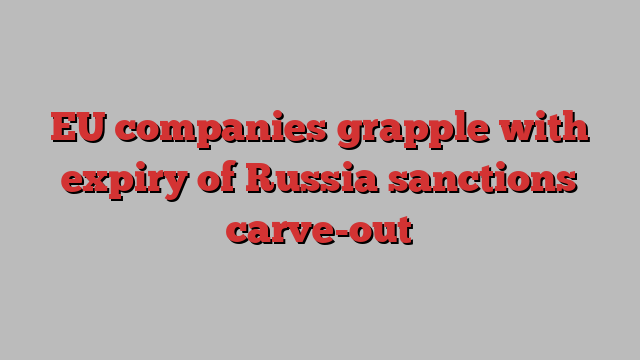
Stay informed with free updates
Simply sign up to the War in Ukraine myFT Digest — delivered directly to your inbox.
European companies still operating in Russia are scrambling to comply with a new EU sanctions provision that could significantly alter the way they do business in the country.
More than two years since Vladimir Putin ordered the full-scale invasion of Ukraine, multinationals are on the cusp of losing a carve-out that allowed them to provide their Russian subsidiaries with professional services like accounting, management consulting and legal advice.
The change in policy comes as Brussels seeks to close myriad loopholes in its sanctions against Russia — a tapestry of measures imposed in 13 different tranches since February 2022 — and limit the Kremlin’s ability to fund its war machine.
The new provision, which will enter into force in June, will give European regulators their most detailed overview of western businesses’ current dealings in Russia to date.
However lawyers and executives warn that the change may inadvertently compel companies to switch to Russian providers, or instead provide these services from offices outside the EU.
“There was no reason at all to throw out the exemption for the European subsidiaries . . . Nobody wanted to throw these companies into the arms of Russian consultants,” said one European executive in Moscow.
Many international companies in the consumer goods, pharmaceuticals, retail and manufacturing sectors have continued to do business in Russia, despite a widespread corporate exodus and successive rounds of sanctions targeting different sectors of the Russian economy in response to the war.
Their ability to do business in the country is in large part owing to an exemption for companies being allowed to offer professional services to their own subsidiaries in Russia, while being banned from providing those same services to other companies. The European Commission announced in December that this exemption would no longer apply as of this year.
Instead of being exempt automatically, companies as of June 20 will have to seek authorisation from national authorities for every type of service they supply their Russian subsidiaries with, said a commission spokesperson.
The commission’s change “closes a loophole which had been identified in the exemption system”, the spokesperson added.
Companies have since been reviewing every type of service they offer to each of their affiliates and in order to obtain authorisations before the grace period ends.
“There’s a lot of speculation around what the EU was aiming to achieve here,” said Skadden lawyer Michael Albrecht vom Kolke. He said he viewed this as “some kind of stock taking exercise in which the EU tries to understand how many entities are still active in Russia”.
While many companies were working to obtain the authorisations, he added, others might choose to relocate functions to offices outside the bloc, which could be challenging given that it is prohibited to circumvent sanctions.
Other lawyers have also warned that the bureaucratic burden was diverting resources away from more meaningful sanctions compliance.
David Lorello, partner at law firm Covington & Burling said regulators and companies could instead be focusing on countering Russian strategies to acquire restricted goods and conceal sanctioned assets.
The European Federation of Pharmaceutical Industries and Associations, a Brussels-based industry group, said the removal of the exemption would make it more difficult for drug companies to provide medicines to patients.
“We continue to seek solutions to the issues related to implementation of the sanctions by national competent authorities in dialogue with the EU authorities,” it said.